#tribe twelve confessions
Explore tagged Tumblr posts
Text
Thanks to @daily-zutara-prompts for the prompt. Might continue this story eventually.
She sat next to the window on this flight. She was surprised to see who she was sitting with this time. It was him! The same man who bumped into her at the coffee shop in the terminal. She felt so embarrassed.
"Hi," she said, when he saw her looking at him. "I see you changed your shirt."
"Yeah," the man with the dark hair and scarred face said, the glare remaining in place despite her attempts to be friendly. "Funny, I didn't relish the idea of smelling like cold espresso for the next twelve hours."
Sheepishly, Katara turned back towards the window. It was going to be a long flight.
She might have said a word or two in her defense, or to chastise the man for his rudeness, but she still felt the sting of embarrassment at spilling her coffee all over him, and truthfully it had been her fault for looking at her phone instead of watching where she was going. Still, he didn't have to give her such an attitude about it. People like that weren't worth getting worked up over. She would just ignore him the rest of the flight and try to get some rest. It was going to be a long night, and a lot of people were expecting her to be able to perform the next day.
She drifted in and out of sleep, each time jolted awake by the movement of the plane, and each time she opened her eyes she saw that the man sitting next to her was staring straight ahead. His fingers drummed on the armrest as if he were trying to drill holes in it. That was what had woken her up this time, his incessant tapping worming its way under her eyelids and beating out a discordant, anxious rhythm in her tired brain.
"Are you alright?" she asked finally, stuffing down her annoyance at this man who clearly seemed in distress.
His fingers ceased their tapping motion and he turned to look at her as if she had just doused him in espresso again, the condescending glare still plastered on his face. After a moment, he spoke.
"I haven't been home in three years. My dad doesn't even try to contact me or take any of my calls, then all the sudden he books a red eye for me to fly back to the Fire Nation immediately."
Katara had no idea what to say to that. Although it did somewhat explain the man's bad mood, she couldn't think of a reply, and didn't know what she was expected to say. Maybe he just needed someone to confess his feelings to.
"This is my first time going to the Fire Nation," she said, thinking that small talk might relax him. Although she'd been a Water Tribe ambassador for years in the Earth Kingdom, it had only been recently that the Fire islands had opened themselves up to diplomatic visits from other countries, and Katara had to admit she was a bit nervous.
She watched the man's shoulders loosen a bit. He looked out the window, as if there was anything to see besides blackness. Then he looked out at the rows of passengers, most of whom were dozing or wearing headsets, and turned to her. "You should try the shaved ice," he said, as if he were telling her some secret, his eyes lighting up in a way that gave Katara whiplash for the way it contrasted with his previous foul mood. "Spiced mango is my favorite."
"I'll definitely give it a try," she said, smiling at his sudden enthusiasm for shaved ice. She thought maybe he would say more, but then he fell silent again, his gaze shifting to his lap, and he seemed deep in thought.
Katara managed to get a few more hours of sleep, full of fitful dreams and the sounds of the plane around her. Finally, she saw daylight peeking over the horizon, and the pilot announced that they were approaching the Fire Nation capital.
Katara said goodbye to her traveling companion and he gave a noncommittal wave as he grabbed his carry-on and hurried towards the exit. He was several feet ahead of her at the gate when she saw him being greeted by three men in black suits who took his bags as he stood, looking distinctly uncomfortable.
"Welcome home, Prince Zuko," one of them said reverently.
Katara stared, feeling like someone had poured espresso over her head.
34 notes
·
View notes
Note
Please share more about Chiara. She looks really cool😎
Aaaaahhh, thank you, Anon! 🥹🫶🏽 I enjoy putting her into situations, so I hope other people will enjoy her, too!
Some Chiara origin story/fun facts below the cut 🤭
So me being me, of course this is another Indigenous OC, because representation is important and I'll never ever shut up about that :)
Her full name is Chiara Kahhori St. Claire because I'm OBSESSED with that episode of What If . . . ? and I think Chiara and Kahhori would be so much fun together. In this essay I will --
A member of the Mohawk tribe, she was born and raised in upstate New York by her mom and grandma. Mostly by her grandma, because speaking of her mom!
Chiara's mom, Monica St. Claire, is a super successful lawyer who's pretty much always traveling for work
Monica may or may not have worked for Stark Industries as a legal advisor back in the day. She also may or may not have had a secret enemies to lovers back to enemies relationship with Tony Stark during that time. She may or may not have quit and fled back to New York when they broke up. And Tony may or may not be Chiara's biological father -- who's to say, since no one has been brave enough to run a paternity test?
(Slightly off topic, but sometimes I mess around with an au in which Chiara is raised by her father instead of her mother, and that shit is WILD lmao. They are a complete disaster and I love that.)
ANYWAYS
Chiara can be a menace. Are her actions cries for attention? Absolutely. Still a menace, though!
This girl basically terrorizes the Catholic school she goes to growing up
Ex: At age twelve, she refuses to do confession because "I literally have Saint in my last name, I'm basically already halfway to canonization." Age thirteen, she begins referring to the priests solely as "Pops" and/or "Daddy-O." And of course, at age fourteen, the final straw that gets her kicked out is stealing wine before Communion with some older kids.
Also at age fourteen!
Everyone forgets Chiara's fourteenth birthday. She's devastated. That night, she sees a shooting star go overhead and offhandedly makes a wish that she were important
The next thing she knows, she's got very villain-coded powers. She can manipulate/animate shadows, travel though them, take the light out of rooms, etc. Oops.
Now at age fifteen, she's been moved to Queens for a fresh start after getting kicked out of her last school, and she's trying so so hard to hide these weird-ass powers because they lowkey terrify her, and she's pretty sure that her "importance" is supposed to come from being some sort of villain -- because no hero would have such dark powers . . . Right?
There's definitely more thoughts, but at the risk of accidentally making you read a whole novel length list of ideas, I'll exercise some self control and end here for now
#anon thank you thank you thank you for giving me the chance to talk about my girlie#I am nothing but a vessel for Chiara lore these days#me and my wips about her against the world >:)#anonymous#asks#oc chiara st claire
5 notes
·
View notes
Text
HUGE TW FOR AD*M R*SNER, AND TRIBE TWELVE
THE ADAM ROSNER PHONE CALL IS NO LONGER LOST MEDIA!
The original channel the video was on was deleted against the uploader's will a while back, making the whole confession to all of the awful shit he did that he gave in that phone call temporarily lost media. Finally, thanks to the cooperation of some great archivists, one of the most easily accessible pieces of evidence proving how terrible Adam is can be seen publicly again.
You can watch the Wild upload here
You can watch the Serafina upload here
A transcript for the video is currently in the works, so it is more easily digestible.
#adam rosner fans dni#yall make me sick#adam rosner throw yourself in a river challenge#tw adam rosner#tw tribetwelve#adam rosner#tribetwelve
58 notes
·
View notes
Text
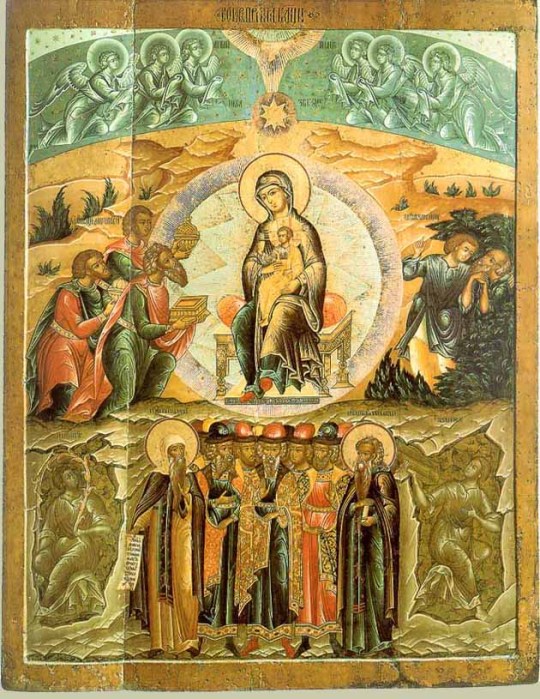
The seedless birth of Christ can and could be denied only by those who deny the Gospel, whereas the Church of Christ from of old confesses Christ "incarnate of the Holy Spirit and the Virgin Mary." But the birth of God from the Ever-Virgin was a stumbling stone for those who wished to call themselves Christians but did not wish to humble themselves in mind and be zealous for purity of life. The pure life of Mary was a reproach for those who were impure also in their thoughts. So as to show themselves Christians, they did not dare to deny that Christ was born of a Virgin, but they began to affirm that Mary remained a virgin only until She brought forth Her first-born son, Jesus (Matt. 1:25).
"After the birth of Jesus," said the false teacher Helvidius in the 4th century, and likewise many others before and after him, "Mary entered into conjugal life with Joseph and had from him children, who are called in the Gospels the brothers and sisters of Christ." But the word 'until' does not signify that Mary remained a virgin only until a certain time. The word 'until' and words similar to it often signify eternity. In the Sacred Scripture it is said of Christ: In His days shall shine forth righteousness and an abundance of peace, until the moon be taken away (Ps. 71:7), but this does not mean that when there shall no longer be a moon at the end of the world, God's righteousness shall no longer be; precisely then, rather, will it triumph. And what does it mean when it says: For He must reign, until He hath put all enemies under His feet? (1 Cor. 15:25). Is the Lord then to reign only for the time until His enemies shall be under His feet?! And David, in the fourth Psalm of the Ascents says: As the eyes of the handmaid look unto the hands of her mistress, so do our eyes look unto the Lord our God, until He take pity on us (Ps. 122:2). Thus, the Prophet will have his eyes towards the Lord until he obtains mercy, but having obtained it he will direct them to the earth? (Blessed Jerome, 'On the Ever-Virginity of Blessed Mary'). The Saviour in the Gospel says to the Apostles (Matt. 28:20): Lo, I am with you always, even unto the end of the world. Thus, after the end of the world the Lord will step away from His disciples, and then, when they shall judge the twelve tribes of Israel upon twelve thrones, they will not have the promised communion with the Lord? (Blessed Jerome, op. cit.)
It is likewise incorrect to think that the brothers and sisters of Christ were the children of His Most Holy Mother. The names of 'brother' and 'sister' have several distinct meanings. Signifying a certain kinship between people or their spiritual closeness, these words are used sometimes in a broader, and sometimes in a narrower sense. In any case, people are called brothers or sisters if they have a common father and mother, or only a common father or mother; or even if they have different fathers and mothers, if their parents later (having become widowed) have entered into marriage (step-brothers); or if their parents are bound by close degrees of kinship.
In the Gospel it can nowhere be seen that those who are called there the brothers of Jesus were or were considered the children of His mother. On the contrary, it was known that James and others were the sons of Joseph, the Betrothed of Mary, who was a widower with children from his first wife (St. Epiphanius of Cyprus, 78). Likewise, the sister of His Mother, Mary the wife of Cleopas, who stood with Her at the Cross of the Lord (John 19:25), also had children, who in view of such close kinship with full right could also be called brothers of the Lord. That the so-called brothers and sisters of the Lord were not the children of His Mother is clearly evident from the fact that the Lord entrusted His Mother before His death to His beloved disciple John. Why should He do this if She had other children besides Him? They themselves would have taken care of Her. The sons of Joseph the supposed father of Jesus, did not consider themselves obliged to take care of one they regarded as their stepmother, or at least did not have for her Such love as blood children have for parents, and such as the adopted John had for Her.
Thus, a careful study of Sacred Scripture reveals with complete clarity the insubstantiality of the objections against the Ever-Virginity of Mary and puts to shame those who teach differently.
-- Saint John Maximovitch, The Orthodox Veneration of the Mother of God.
6 notes
·
View notes
Text
Saints&Reading: Friday, December 28, 2023
december 16_december 28
THE HOLY PROPHET AGGEI/HAGGAI (500 B.C.)
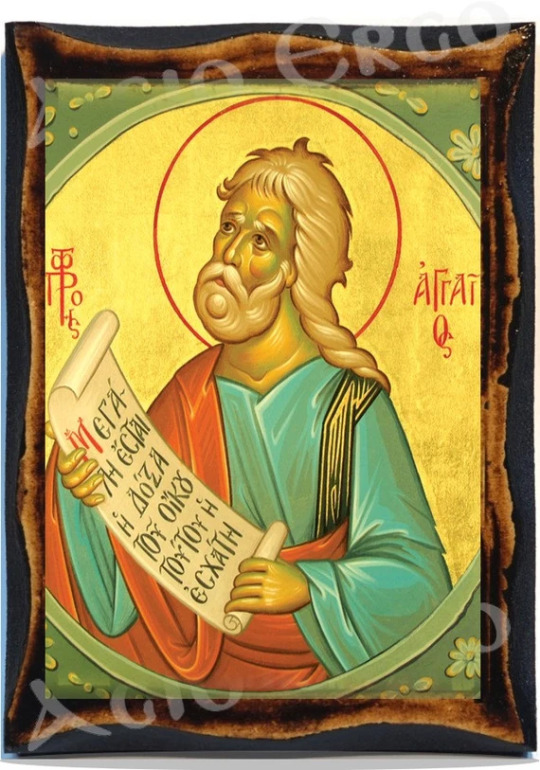
The Holy Prophet Haggai was the tenth of the Twelve Minor Prophets. He was of the Tribe of Levi and he prophesied during the times of the Persian emperor Darius Hystaspis (prior to 500 B.C.). Upon the return of the Jews from the Babylonian Captivity, he persuaded the people to build the Second Temple at Jerusalem, and he proclaimed that the Messiah would appear in this Temple in the last times.
It is believed that Haggai was buried with the priests at Jerusalem, since he was descended from Aaron.
THE BLESSED EMPRESS THEOPHANIA OF BYZANTUM (893)
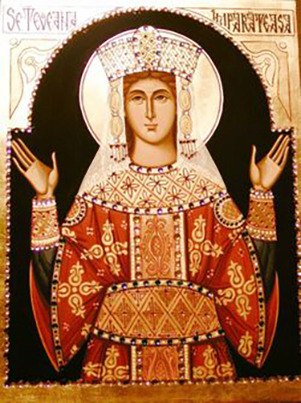
Saint Theophanó was a pious and virtuous Empress, who was greatly praised by the chroniclers of her time because of her evangelical life, her almsgiving, and her exceptional piety. She born in Constantinople, the daughter of Constantine Martinakios and his wife Anna, who raised their daughter with diligence. When she was of a marriageable age, Emperor Basil the Macedonian chose her to be the wife of his son Leo the Wise (886 - 912), with whom she dwelt in marital fidelity for twelve years.
The Holy Empress Theophanó and her husband Leo were imprisoned for three years, because Leo was falsely accused of plotting to assassinate his father, Emperor Basil. After obtaining her freedom,Theophanó spent her life in prayer and fasting, earnestly struggling for her salvation. She was recognized as a Saint and a wonderworker, even during her lifetime, because of the many good works which she performed out of love for her neighbor.
Though she lived in the world, she renounced everything worldly, and became a benefactor of the poor. She also built churches and monasteries, or restored those in need of repair. She was a true mother to her subjects, caring for widows and orphans, and consoling the sorrowful.
Despite all the grandeur and wealth surrounding her, she preserved her customary humility and modesty. She preferred to dress in simple clothing so that she would not recognized. Accompanied by two trusted servants, she would visit the homes of the poor and the persecuted, offering her assistance. Her faith was such that she was found worthy of the gift of performing miracles. When medical science gave up on a patient because it could not heal him, Saint Theophanó restored him to health. In spite of all the bitterness she had experienced in her life, Saint Theophanó could still sing praises to the Lord, according to the words of the Prophet King David: "Sing praises to the Lord, sing praises; sing praises to our King, sing praises" (Psalm 46/47:6).
Saint Theophanó reposed circa 893-894. Even before her death, her husband started to build a church, intending to dedicate it to Theophanó, but she forbade him to do so. It was Emperor Leo who decreed that the Sunday after Pentecost be dedicated to All Saints. Believing his wife to be one of the righteous, he knew that she would also be honored whenever the Feast of All Saints was celebrated.
The incorrupt relics of Saint Theophanó are preserved in the Patriarchal Church of Saint George, at the Phanar in Constantinople. A particle from her relics is in Dionysiou Monastery on Mount Athos.
Source: Orthoodox Church in America_OCA

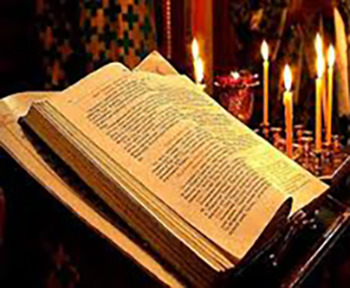
HEBREWS 11:8,11:16
8 By faith Abraham obeyed when he was called to go out to the place which he would receive as an inheritance. And he went out, not knowing where he was going. 11 By faith Sarah herself also received strength to conceive seed, and she bore a child when she was past the age, because she judged Him faithful who had promised. 12 Therefore from one man, and him as good as dead, were born as many as the stars of the sky in multitude-innumerable as the sand which is by the seashore. 13 These all died in faith, not having received the promises, but having seen them afar off were assured of them, embraced them and confessed that they were strangers and pilgrims on the earth. 14 For those who say such things declare plainly that they seek a homeland. 15 And truly if they had called to mind that country from which they had come out, they would have had opportunity to return. 16 But now they desire a better, that is, a heavenly country. Therefore God is not ashamed to be called their God, for He has prepared a city for them.
MARK 9:33-41
33 Then He came to Capernaum. And when He was in the house He asked them, "What was it you disputed among yourselves on the road?" 34 But they kept silent, for on the road they had disputed among themselves who would be the greatest. 35 And He sat down, called the twelve, and said to them, "If anyone desires to be first, he shall be last of all and servant of all." 36 Then He took a little child and set him in the midst of them. And when He had taken him in His arms, He said to them, 37 Whoever receives one of these little children in My name receives Me; and whoever receives Me, receives not Me but Him who sent Me. 38 Now John answered Him, saying, "Teacher, we saw someone who does not follow us casting out demons in Your name, and we forbade him because he does not follow us." 39 But Jesus said, "Do not forbid him, for no one who works a miracle in My name can soon afterward speak evil of Me. 40 For he who is not against us is on our side. 41 For whoever gives you a cup of water to drink in My name, because you belong to Christ, assuredly, I say to you, he will by no means lose his reward.
#orthodoxy#orthodoxchristianity#easternorthodoxchurch#originofchristianity#spirituality#holyscriptures#gospel#wisdom#bible#saints
2 notes
·
View notes
Text
Myths of the Realm and Beyond: Mira's version
I've gotten some folks over on the hell bird site asking about the differences in MotR given I changed a lot of it because it's pretty stinky. How does one even fuck up a story about gods? Anyway, Mira has a different story all together that goes a bit beyond what canon gave us but it ties back into her version of Myths. It's also shitty because I wrote it in google notes so it's not polished and more outline.
Pre-story (Mira's end):
-Mira and Oschon know each other to an extent since ARR.
-Budding adventurer Mira taking advice from experienced adventurer Deryk, especially since she's fresh from Ishgard.
-Spots Deryk around from time to time in the various areas. Think Machein from FFX except no lore dumps. Shows up randomly in places.
-Mira notices that he doesn't tend to go into Ishgard or Ul'dah except for a rare chance. (Rare chance he's meeting a friend who gets on his case about not visiting more. Nald'thal just misses him and Halone just tell him to wear longer clothes so he doesn't freeze his tit off.)
-She notices his distance when mentioning The Wanderer's Palace but just assumes he's just sad about the tonberries.
-Mira confesses that she's not fond of the gods but she doesn't hate them really, just she's learned to depend on herself more than prayer.
-Tends to keep mostly quiet around that because Mira isn't an asshole.
(Oschon's end)
-He does come to Mira unknown to her a couple of times when she's in the worst: at Azeyma's Mark after the massacre on the Waking Sands and after her mother's passing.
-The above is mainly because he was in the area at the same time as her. More of a presence because gods can't favor mortals for some reason? Who came up with that no one knows.
-He tends to prefer Limsa and Gridania because they feel a bit closer to the mountains and nature.
-Like original canon, he tends to travel alone.
-There's a lot of guilt he has involving the Wanderer's Palace and how he didn't do anything (or could do) to help the people there.
-He doesn't realize he has some kind of feelings for Mira until Stormblood patches. He doesn't act on them because mortal until Myths's end.
-Instead of a usual good bye, he tends to say "May the wind ever be at your back." Mira thinks it as a kind of prayer invoking Oschon but doesn't realize it's just him saying it.
General God Things:
-THEY ARE GODS, NOT ANCIENTS.
-How were they born? They just appeared one by one. Oschon's origin story is truth.
-Outside of Oschon, the other Twelve don't really know how to interact with mortals/find them more cute and fascinating.
-Dalamud doggo was always a thing. Grew from puppy to large doggo due to worship.
-Menphina just rolled with being called Oschon's divine lover because she has more than romantic thoughts of love in her head. She's so full of love.
-Some of the gods do have some features of their worshippers like Azeyma and Menphina with the miqo'te tribes.
-Halone is on the ace spectrum. Demi if specific. She enjoys a good fight most of all but she can feel the dokis.
-Halone and Nophica know about the porn. And the hate fucking mortals write fics about. They don't get it but mortals do what mortals do.
-FAT NOPHICA. Look, fertility gods tend to be chubby so she's got big tiddy and big body.
ACTUAL MYTHS STORYLINE:
-No Students. They were pretty pointless in the story so knocking that off
-Smaller scale, focus on Mira and her faith and connection with the gods.
-Twelve at first were wondering why Oschon had an interest in this mortal's thoughts about them, Menphina is the first to outright say he's in love.
-Understanding each other mostly. Some are fights because sometimes seeing how someone is during a battle helps.
-Gods stay but also make mortal forms so they can be a bit more active with their worshippers.
#ffxiv#ffxiv wol#mira chambers#mira lore#myths of the realm#the twelve ffxiv#ffxiv deryk#oschon#halone#nophica
0 notes
Photo

NEW JERUSALEM THE HEAVENLY CITY -- KJV (King James Version) Bible Verse List Visit https://www.billkochman.com/VerseLists/ to see more. "In my Father's house are many mansions: if it were not so, I would have told you. I go to prepare a place for you. And if I go and prepare a place for you, I will come again, and receive you unto myself; that where I am, there ye may be also." John 14:2-3, KJV "But Jerusalem which is above is free, which is the mother of us all." Galatians 4:26, KJV "By faith Abraham, when he was called to go out into a place which he should after receive for an inheritance, obeyed; and he went out, not knowing whither he went. By faith he sojourned in the land of promise, as in a strange country, dwelling in tabernacles with Isaac and Jacob, the heirs with him of the same promise: For he looked for a city which hath foundations, whose builder and maker is God . . . These all died in faith, not having received the promises, but having seen them afar off, and were persuaded of them, and embraced them, and confessed that they were strangers and pilgrims on the earth. For they that say such things declare plainly that they seek a country. And truly, if they had been mindful of that country from whence they came out, they might have had opportunity to have returned. But now they desire a better country, that is, an heavenly: wherefore God is not ashamed to be called their God: for he hath prepared for them a city." Hebrews 11:8-10, 13-16, KJV "But ye are come unto mount Sion, and unto the city of the living God, the heavenly Jerusalem, and to an innumerable company of angels, To the general assembly and church of the firstborn, which are written in heaven, and to God the Judge of all, and to the spirits of just men made perfect, And to Jesus the mediator of the new covenant, and to the blood of sprinkling, that speaketh better things than that of Abel." Hebrews 12:22-24, KJV "Let us go forth therefore unto him without the camp, bearing his reproach. For here have we no continuing city, but we seek one to come." Hebrews 13:13-14, KJV "Him that overcometh will I make a pillar in the temple of my God, and he shall go no more out: and I will write upon him the name of my God, and the name of the city of my God, which is new Jerusalem, which cometh down out of heaven from my God: and I will write upon him my new name." Revelation 3:12, KJV "And I John saw the holy city, new Jerusalem, coming down from God out of heaven, prepared as a bride adorned for her husband. And I heard a great voice out of heaven saying, Behold, the tabernacle of God is with men, and he will dwell with them, and they shall be his people, and God himself shall be with them, and be their God . . . And there came unto me one of the seven angels which had the seven vials full of the seven last plagues, and talked with me, saying, Come hither, I will shew thee the bride, the Lamb's wife. And he carried me away in the spirit to a great and high mountain, and shewed me that great city, the holy Jerusalem, descending out of heaven from God, Having the glory of God: and her light was like unto a stone most precious, even like a jasper stone, clear as crystal; And had a wall great and high, and had twelve gates, and at the gates twelve angels, and names written thereon, which are the names of the twelve tribes of the children of Israel: On the east three gates; on the north three gates; on the south three gates; and on the west three gates. And the wall of the city had twelve foundations, and in them the names of the twelve apostles of the Lamb. And he that talked with me had a golden reed to measure the city, and the gates thereof, and the wall thereof. And the city lieth foursquare, and the length is as large as the breadth: and he measured the city with the reed, twelve thousand furlongs. The length and the breadth and the height of it are equal. And he measured the wall thereof, an hundred and forty and four cubits, according to the measure of a man, that is, of the angel. And the building of the wall of it was of jasper: and the city was pure gold, like unto clear glass. And the foundations of the wall of the city were garnished with all manner of precious stones. The first foundation was jasper; the second, sapphire; the third, a chalcedony; the fourth, an emerald; The fifth, sardonyx; the sixth, sardius; the seventh, chrysolite; the eighth, beryl; the ninth, a topaz; the tenth, a chrysoprasus; the eleventh, a jacinth; the twelfth, an amethyst. And the twelve gates were twelve pearls; every several gate was of one pearl: and the street of the city was pure gold, as it were transparent glass. And I saw no temple therein: for the Lord God Almighty and the Lamb are the temple of it. And the city had no need of the sun, neither of the moon, to shine in it: for the glory of God did lighten it, and the Lamb is the light thereof. And the nations of them which are saved shall walk in the light of it: and the kings of the earth do bring their glory and honour into it. And the gates of it shall not be shut at all by day: for there shall be no night there. And they shall bring the glory and honour of the nations into it. And there shall in no wise enter into it any thing that defileth, neither whatsoever worketh abomination, or maketh a lie: but they which are written in the Lamb's book of life. And he shewed me a pure river of water of life, clear as crystal, proceeding out of the throne of God and of the Lamb. In the midst of the street of it, and on either side of the river, was there the tree of life, which bare twelve manner of fruits, and yielded her fruit every month: and the leaves of the tree were for the healing of the nations. And there shall be no more curse: but the throne of God and of the Lamb shall be in it; and his servants shall serve him: And they shall see his face; and his name shall be in their foreheads. And there shall be no night there; and they need no candle, neither light of the sun; for the Lord God giveth them light: and they shall reign for ever and ever. And he said unto me, These sayings are faithful and true: and the Lord God of the holy prophets sent his angel to shew unto his servants the things which must shortly be done . . . I am Alpha and Omega, the beginning and the end, the first and the last. Blessed are they that do his commandments, that they may have right to the tree of life, and may enter in through the gates into the city." Revelation 21:2-3, 9-27, 22:1-6, 13-14, KJV If you would like more info regarding the origin of these KJV Bible verse lists, go to https://www.billkochman.com/VerseLists/. Thank-you! https://www.billkochman.com/Blog/index.php/new-jerusalem-the-heavenly-city-kjv-king-james-version-bible-verse-list/?feed_id=192724&NEW%20JERUSALEM%20THE%20HEAVENLY%20CITY%20--%20KJV%20%28King%20James%20Version%29%20Bible%20Verse%20List
#All_Posts#Bible_Verse_Lists#bible#bible_study#bill_kochman#bills_bible_basics#heavenly_city#king_james_version#kjv#list#new_jerusalem#scripture#scriptures#topical#verse#verses
0 notes
Text
Judges 20: 33-36. "The God of Good Taste."

The skirmish between all of Israel and the renegade Tribe of Benjamin concludes. As with all Torah related content, one must learn never to root for any side of a fight but the one taken by the Most High. This fight has gone back and forth, and of course we were hoping the Benjaminites who had taken up position on the Highest Ground were going to win the fight and live out the rest of their lives in an eternal state of Shabbat, but something went wrong.
The reason is central to the entire theme of the Shoftim, called Baal Tamar, "the god of the most enligthened tastes."
We know of the importance of Shabbat and leaving all that religious stuff behind us someday, but what happens then? The Shoftim says
Baal Tamar is west of Gibeah, meaning it is found along the West by Northwest Wall, #3924, גטבד, gtbd, "you got it, the wine and the cloth."
The risk we manage by maintaining the integrity of all Twelve Tribes all at once is called disaster avoidance. While the goal of Judaism is Shabbat, it does mean one mixes and mingles with the world at large as if nothing happened in the shule. Assimilation is a disaster. Assimilation means opining over non-Jewish politics and mass movements, it means accepting naive and incomplete ideas about God and the State of Israel.
The Shoftim explains how the sword of separate but together works so disaster does not take place, resulting in Baal Tamar instead:
33 All the men of Israel moved from their places and took up positions at Baal Tamar, and the Israelite ambush charged out of its place on the west[c] of Gibeah.[d]
34 Then ten thousand of Israel’s able young men made a frontal attack on Gibeah. The fighting was so heavy that the Benjamites did not realize how near disaster was.
35 The Lord defeated Benjamin before Israel, and on that day the Israelites struck down 25,100 Benjamites, all armed with swords. 36 Then the Benjamites saw that they were beaten.
The Values in Gematria are:
v. 33. All the men of Israel took up positions. In Shmot, the Departure, we know Moses put the Column of Israel in priority order and weighted them by lot. In Vaera, we learn how the "aroused wild ass becomes one with God." Oneness with God is the objective, not a particular tribal identity. How one accomplishes this, becomes fully totally Jewish and also Shoftim is the subject of this forum.
The Number is 6179, ואזט, and az, "and therefore..."
v. 34. The fighting was heavy. The fighting in Jewish communities is always heavy because no one knows what they are talking about, and niether do their opponents. The goal of arguing the meaning of the Tanakh is usually not clear nor are the research points and references because we do not actually know with 100 percent precision what they say. We only know we must make an attempt at being as civilized and as happy as possible all our lives.
Jews perceive God as a suspicious being who depends on His ambiguity in the Torah for His Superiority. But this is not what He said to Moses when the all-important moment when Shabbos and Shabbat - freedom from ignorance and slavery were the topics of discussion between them.
Ten thousand young men are needed to resolve this dilemma, meaning we need ten legions of lifetimes in order to assimilate the decrees and exit into a way of life that has not one hint of strife left within it. If we are not attempting to argue the strife out of existence we are not arguing the correct aspects of the Torah. Strife is forbidden.
The Number is 9646, טודו, todo=
admit
לְהוֹדוֹת, לְהַכנִיס, לְהַרְשׁוֹת
thank
לְהוֹדוֹת, להביע תוֹדָה
confess
לְהוֹדוֹת, לְהִתְוַדוֹת
acknowledge
לְהוֹדוֹת
avow
לְהוֹדוֹת, לְהַבטִיחַ
grant
לְהַעֲנִיק, לָתֵת, לְזַכּוֹת, לְהַסכִּים, לְהוֹדוֹת, לָחוֹן
glorify
לְפַאֵר, לְרוֹמֵם, לְשַׁבֵּחַ, לְהוֹדוֹת
praise
לְשַׁבֵּחַ, לְהַלֵל, לְבָרֵך, לְקַלֵס, לְדַבֵּר בְּשִׁבחוֹ, לְזַמֵר
concede
לְהוֹדוֹת, לְוַתֵר, לְוַתֵר עַל
I knew all this already. I swear I did.
v. 35-36. The Lord defeated Benjamin before Israel, and on that day the Israelites struck down 25,100 Benjamites, all armed with swords. 36 Then the Benjamites saw that they were beaten.
So now we know how to argue the Torah and Tanakh, and how to integrate all the research and Halachah into one consolidated Jewish thought.
The Number is 11503, יאהאֶפֶסג, Yah Ephesus, "How to properly reach the Summit, the abode of Yah."
As we discovered in the Midrash on the Book of Job, there are various configurations the molecules formed by the Alefbeis will assume and then imprint upon and change the structure of the mind. My Torah is modestly translated but not fully decrypted. It should be put through as full a process of illumination as possible before we presume we can take the elevator all the way to the top. Stairs will have to do until then.
0 notes
Text
Joseph Prince Daily Devotional 27th December 2023 – Precious in God’s Eyes.

The topic of Joseph Prince Devotional for 27th December 2023 Is “Precious in God’s Eyes” Scripture: Revelation 3:5 “He who overcomes shall be clothed in white garments, and I will not blot out his name from the Book of Life; but I will confess his name before My Father and before His angels.”
DAILY GRACE INSPIRATION 27TH DECEMBER 2023
I want to show you an aspect of how God sees you today through a beautiful truth about the breastplate of the high priest of ancient Israel. Today, Jesus is our High Priest, and as we examine the breastplate, I want you to see something powerful about the way the Lord sees His people. Notice in the illustration that there are twelve stones on the high priest’s breastplate, and the names of the twelve tribes of Israel are engraved on the stones. For example, “Judah” is engraved on the sardius stone set in the first row, and “Gad” is engraved on the diamond set in the second row.
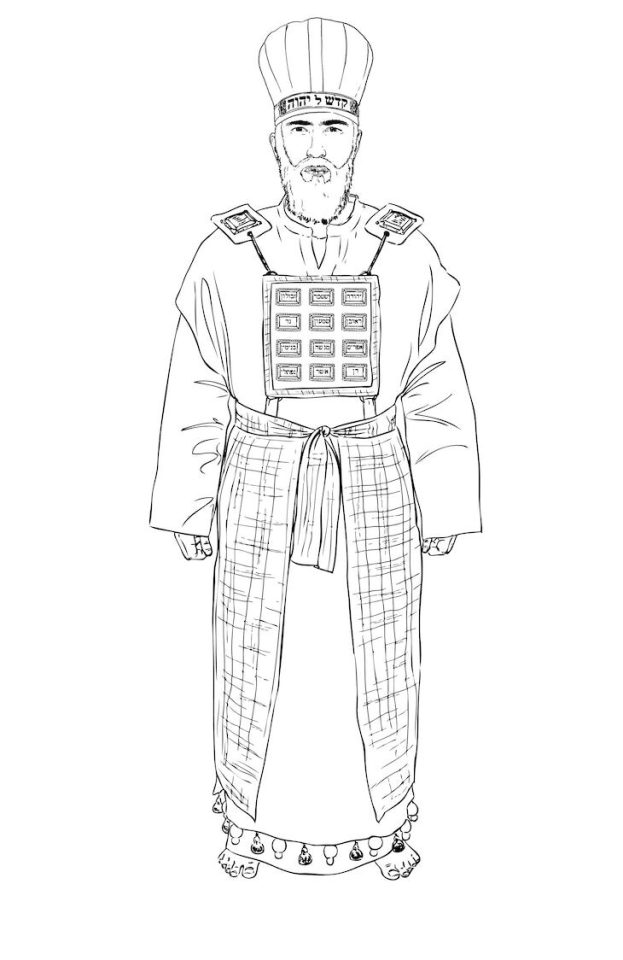
The high priest of Israel: The names of the 12 tribes of Israel are engraved on 12 precious stones found on his breastplate. These twelve stones represent God’s people today. Notice how God depicts His people, you and me, as precious stones. He didn’t use common rocks and pebbles. He deliberately chose very costly, rare, and precious gems such as sapphire, topaz, emerald, amethyst, diamond, onyx, and jasper to represent you and me (Exod. 39:9–14). Also, of all the garments donned by the high priest, the breastplate is closest to the heart. This speaks of how much the Lord values you and His desire to keep you close to His heart. In His eyes, you are very costly, precious, and loved. Notice also that the names of the tribes of Israel were not merely written on the gems; they were engraved (Exod. 39:14). This means that once you become a believer in Jesus, your name is forever engraved in His Book of Life. If your name were only written, you might think that it could easily be erased or blotted out. But the truth is that Jesus has engraved your name on a precious stone, and He keeps it close to His heart. Can your name ever be blotted out of its place on God’s heart? Just look at what Jesus promises those who are born again: “He who overcomes shall be clothed in white garments, and I will not blot out his name from the Book of Life; but I will confess his name before My Father and before His angels” (Rev. 3:5). Beloved, through Christ Jesus, you are an overcomer, and in Christ Jesus, you are eternally secure. Rest in the assurance that your name will not be blotted out from the Book of Life. It will remain engraved on stone and close to God’s heart for all eternity! Read the full article
0 notes
Text









Oh, the guilt
The End
Our little tribe has always been and always will be until the end
Hello hello hello how low
My red hot shaft
It’s a war from the depth of time
Everything can change on a New Year’s Day
You can buy a dream or two to last you all through the years
And the only price you pay is a heart full of tears
Leave the city. Can't we go?
Can't we tho? I mean, right now.
There must be something I can dream tonight
The air is filled with the moves of you(I dreamed of someone this morning who was leaving )
Young American girl
We're getting stronger now
These entities are thought to be there to guide the receiver and set in motion a sequence of events ensuring that said receiver fufills his or her duties. This sequence of events is known as the "Ensurance Trap", and it essentially forces the receiver to save the universe.
Think about it all the time
Never let it out of my mind
Lift up the receiver, I’ll make you a believer
Things on the chest you need to confess
They say that which you mock will overtake you
You’re in high school again
Makes no sense at all
Makes no sense to fall
Falling as the world falls down
Lying under this spell you cast on me
dreaming evil, I have done my hitch over the plain houses, light by light: lonely thing, twelve-fingered, out of mind.
I never knew what love could do till yesterday
they sprang out behind hedges like dogs to bark at my world
Ain't I the best you had
Hi dave
I wonder why you do these things to me
God damn right, you should be scared of me
Down and dirty, you're loving me so loud
Side show it in front of the whole crowd
And there's a thousand cards to play until you play your life away
Because I take full advantage of every man I meet
I get away almost every day with what the girls call, what the girls call, what the girls call murder
And I am freaking out in the middle of the street with the complete conviction of someone who's never had anything actually really bad happen to them

0 notes
Text
"The Spread of Christianity in the British Isles: Monastic Missions and Roman Authority Triumphs"
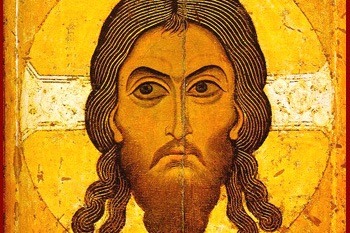
The spread of Arianism among Germanic tribes and the conversion of the Franks to Roman faith were noted. Catholic orthodoxy was gradually accepted by Germanic invaders. However, there was still much to do. The church's vitality during the collapsing empire and opening Middle Ages was shown through its successful extension of Christianity.
Ireland and Scotland
Christianity was present in British Isles before Constantine's conversion. The Roman Empire's downfall weakened it among the Celtic population, while the Anglo-Saxon invaders won much of southern and eastern England for heathenism. Christian beginnings were found mainly in southern Ireland before Patrick. However, he greatly advanced the cause of the Gospel in Ireland and organized its Christian institutions, earning the title of Apostle of Ireland.
Patrick was born in 389 and was the son of a deacon and grandson of a priest. He was trained in Christianity. In 405, he was taken as a slave in Ireland for six years. He was able to escape to the Continent and lived in the monastery of Lérins for some time. In 432, he was ordained a missionary bishop by Bishop Germanus of Auxerre. Patrick then began his work in Ireland, where he spent most of his time in the northeast, with some efforts in the south and west. Despite few facts surviving, there is no doubt about his zeal and his abilities as an organizer. He systematized and advanced Christianity in Ireland. Patrick brought the island into association with the Continent and with Rome.
Patrick introduced the diocesan episcopate into Ireland, but it was soon modified by the island's clan system, resulting in many monastic and tribal bishops. Finian of Clonard (470?-548) developed the unique Irish monasticism, which included strong missionary efforts and notably learned monasteries. The Irish monastic schools were famous in the sixth and seventh centuries, and the monasticism's greatest achievement was its missionary work.
The origins of Christianity in Scotland are unclear. Ninian and Kentigern spread the religion in the 4th and 5th centuries respectively, but not much is known about their work. There is a possibility that the Irish settlers who founded the kingdom of Dalriada in 490 were Christians. However, the most influential missionary was Columba. He founded a successful monastery on the island of Iona and went on to spread the Gospel among the Picts in the northern regions of Scotland. Christianity in Scotland was mainly monastic, with bishops under the authority of Columba and his successors as abbots of Iona.
Missionaries on the Continent
Irish missionaries brought Christianity to northern England, Lindisfarne. Aidan, a monk from lona, established a new Iona on the island in 634. Christianity was then widely spread in the region by Aidan and his associates. These Celtic monks were also active outside of the British Islands. Columbanus, a monk from the Irish monastery of Bangor, founded the monastery of Luxeuil in Burgundy. He later established the monastery of Bobbio in northern Italy, where he died a year later.
Columbanus was one of many Irish monks who worked in central and southern Germany. They introduced private confession to the laity, which was widely supported by the Irish monks. The Irish also created the first penitential books with appropriate satisfactions for specific sins. These books were made familiar on the Continent by the Irish monks.
Roman Missionaries in England
Pope Gregory the Great sent Augustine, a Roman friend, and several monastic companions to convert the Anglo-Saxons. After much struggle, Æthelberht and many of his followers accepted Christianity. Augustine was then appointed as a metropolitan bishop and was authorized to establish twelve bishops under his jurisdiction. It took almost a century for Christianity to become dominant in England, but the movement strengthened the papacy and produced some of the most energetic missionaries on the Continent.
The acceptance of Christianity in England was not without difficulty. After the death of Ethelberht, the power of Kent declined, and with it the initial Christian successes. Northumbria gradually emerged as the leader. In 627, King Edwin of Northumbria was converted to Christianity through the efforts of Paulinus, who later became bishop of York. However, in 633, the heathen King Penda of Mercia defeated and killed Edwin, leading to a heathen backlash in Northumbria.
Under the Christian King Oswald, who had converted while in exile in Iona, Christianity was re-established in Northumbria with the help of Aidan, who represented the Irish or "Old British" tradition (see ante, p. 197). Penda attacked again, and in 642, Oswald was killed in battle. His brother, Oswy, like him a convert of Iona, struggled to secure all of Northumbria, finally succeeding by 651 and earning widespread recognition as an overlord. English Christianity was becoming firmly established.
Roman Authority Triumphs
Since the arrival of the Roman missionaries, there had been disputes between them and their Irish or Old British counterparts. The differences seemed minor, such as the older system of reckoning used by the Irish and Old British, which resulted in diversity regarding the date of Easter. Additionally, the forms of tonsure and the administration of baptism differed. The Old British Church was monastic and tribal while Roman Christianity was diocesan and organized. The Old British missionaries considered the Pope as the highest dignitary in Christendom, but the Roman representatives held him to have judicial authority which the Old British did not fully accept. Southern Ireland accepted the Roman authority around 630, while England made its decision at a synod in Whitby in 664 under King Oswy. Bishop Colman of Lindisfarne defended the Old British usages, while Wilfrid, previously of Lindisfarne but having won for Rome on a pilgrimage and soon to be bishop of York, opposed. The Roman custom regarding Easter was approved, securing the Roman cause in England. By 703, Northern Ireland had followed the same path, and by 718, Scotland. In Wales, the process of accommodation was much slower and only completed in the twelfth century. Pope Vitalian's appointment of a Roman monk, Theodore, as Archbishop of Canterbury in 668 further strengthened the Roman connection in England. Theodore, an organizer of ability, did much to make permanent the work begun by his predecessors.
The combination of the two streams of missionary effort proved advantageous for English Christianity. While Rome contributed order, the Old British added missionary zeal and a love of learning. The scholarship of Irish monasteries was transplanted to England and strengthened by frequent Anglo-Saxon pilgrimages to Rome. Bede, also known as the "Venerable" (672?-735), was a prominent figure in this intellectual movement. He spent most of his life as a member of the joint monastery of Wearmouth and Jarrow in Northumbria. Like Isidore of Seville a century earlier, Bede's learning encompassed the full range of knowledge of his time, making him a teacher for generations to come. He wrote on chronology, natural phenomena, the Scriptures, and theology. He is most famously known for his "Ecclesiastical History of the English Nation," a highly regarded work that is the principal source of information regarding the Christianization of the British Islands.
Annotated Bibliography
- *The Conversion of the Anglo-Saxon Kingdoms* by Richard Fletcher: This book provides a comprehensive overview of the spread of Christianity in England, including the role of Roman and Celtic missionaries and the conflicts that arose between them.
- *Celtic Christianity: Making Myths and Chasing Dreams* by Ian Bradley: This book explores the origins and development of Celtic Christianity, including its unique monastic traditions and how it influenced the spread of Christianity in the British Isles.
- *Saint Patrick's World: The Christian Culture of Ireland's Apostolic Age* by Liam de Paor: This book provides a detailed account of the life and work of Saint Patrick, including his mission to Ireland and his efforts to establish Christianity on the island.
- *Bede: The Ecclesiastical History of the English People* translated by Leo Sherley-Price: This classic work by the Venerable Bede is a primary source for the history of Christianity in England, providing valuable insight into the early church and its leaders.
- *The Life of Saint Columba* by Adomnan of Iona: This biography of Saint Columba, written by one of his contemporaries, provides a detailed account of his life and work as a missionary in Scotland and his establishment of the monastery at Iona.
1 note
·
View note
Text
Persistence Breaks Resistance | Daily Devotional

In our daily devotional "persistence breaks resistance", we explore the power of persistent prayer & the importance of righteousness in overcoming any form of resistance. The devotion is based on James 5:16. » Friday, 20th January 2023 | I Stand In The Gap Daily Devotional | Persistence Breaks Resistance Yesterday’s daily devotional theme was “God’s protection for my family“ and today’s is about "persistence breaks resistance". Confess your trespasses to one another, and pray for one another, that you may be healed. The effective, fervent prayer of a righteous man avails much. James 5:16 Our anchor verse of James 5:16 is chosen because it speaks to our theme of "persistence breaks resistance". Through persistent prayer, the believer can break down the barriers and obstacles that stand in the way of our relationship with our God, and our ability to live according to His will. With persistent prayer, we can overcome the resistance we encounter in our daily lives, such as doubts, temptations, fears, and other forms of spiritual opposition. Themes found in James 5:16 - Confession: We are encouraged to confess our sins to one another, an important aspect of repentance and forgiveness. - Intercession: We are encouraged to stand in the gap, and pray for one another, where we lift up the needs of others to God. - Healing: By confessing and interceeding, we may be healed. This healing could be emotional, physical, or spiritual healing. - Righteousness: The verse emphasizes that the "effective, fervent prayer of a righteous man avails much". This highlights the importance of righteousness in our prayers. - Power of prayer: The verse emphasizes the power of prayer and its ability to accomplish much. This power is accentuated when the prayer is fervent and offered by a righteous person. - Persistence: Our verse encourages persistence in prayer. - Resistance: The verse teaches how persistent prayer can help us overcome the resistance we encounter in our daily lives. Background to persistence breaks resistance: James as a leader of the early Christian church wrote to "the twelve tribes scattered among the nations", which refers to the Jewish Christians who were scattered throughout the Roman Empire. The whole book provides advice on how to live a Christian life, emphasizes the importance of faith and works, and teaches the demonstration of true faith, which is by good works, whilst addressing issues such as wisdom, trials and temptations, and the dangers of favoritism and partiality. In James 5:16, James encourages his readers to seek patience and persevere in their faith during times of trial, confess their sins to one another, and pray for one another. Our anchor verse is a conclusion to that section and hammers on the power of prayer and the importance of righteousness in our prayers. Similar verses Ask, and it will be given to you; seek, and you will find; knock, and it will be opened to you. Matthew 7:7 Matthew 7:7 emphasizes the power of prayer and the benefits of persistence in asking, seeking, and knocking. It teaches that if we ask God for something with faith and persistence, He will give it to us. And whatever we ask we receive from Him, because we keep His commandments and do those things that are pleasing in His sight. 1 John 3:22 This verse emphasizes that when we keep God's commandments and do what is pleasing in His sight, we can expect to receive answers to our prayers. It also teaches that our righteousness and obedience to God are important elements in the effectiveness of our prayers. Reflection: As Christians, we are encouraged to confess our sins to one another and pray for one another. Confession and intercession are essential aspects of Christian fellowship and help us to maintain the right relationship with God and with each other. This verse, among many other themes, also encourages us to be persistent in our prayers and to keep praying even when it seems that God isn't answering. In all of this, we shouldn't lose sight of the importance of righteousness in our relationship with God, for righteousness is a very important aspect of our faith, if not the only ingredient, which is seen as evidence of our faith. Simply put, when we are righteous, our prayers will be powerful, effective, and responded to. Dear believer, there's power in persistence in anything we set out to do. By persisting, we surely will overcome resistance. Let's Pray: Our Father, our Father, As we begin this day, we come to you in fervent prayer, asking for your guidance and strength. We know that through persistent prayer, we can break down the barriers, the mountains, and any obstacles that stand in the way of our relationship with you and our ability to live according to your stated will. We confess our sins to you and to one another, and we pray for each other, that we may be wholly healed. We ask for the power of your Holy Spirit to work in our lives, that we may be made righteous and holy before you, as you are righteous and holy. We pray for the strength to resist any form of temptation and the divine wisdom to discern your will for our lives. We pray for the power to overcome the resistance we encounter in our daily lives, such as rejections, doubts, abuse, fears, and other forms of spiritual opposition, especially those orchestrated by the evil one. Father, we ask that you would grant us the power of your Holy Spirit, so that we may be effective and fervent in our prayers. We pray that you would hear our cries and answer our petitions. We thank you for the biblical promise that the effective, and fervent prayer of a righteous man avails much. Help us to be persistent in our prayers so that every resistance may be broken in Jesus' name. We trust in your faithfulness to hear and answer our prayers. In Jesus' mighty name we pray, Amen. Read the full article
0 notes
Text

Salutations fellow nerds,
It tis I. I decided to change up the username simply because I don’t have the availability to craft up confession images anymore.
With that said, you can still submit confessions, but I’ll just be posting them straight from the ask box compared to putting them on images. 😇
The next time I can, I’ll be updating my tumblr to fit the new name. 🖤
#tribetwelve#tribe twelve#slenderman#slender man#slendy#slender#tribe twelve confessions#confessions#slenderverse#tribetwelveconfessions#ttconfessions
15 notes
·
View notes
Text


#HE SURE AS HELL DOES HONY#ROGUE GOD DADDY CAN RAM ME UP THE AHOLE ANYFAY#UWUWUW#slenderverse#firebrand#tribe twelve#tt firebrand#dirty slenderverse confession#dirty tribe twelve confession
78 notes
·
View notes
Text
Fic: Can’t Take My Eyes Off Of You (12/?)
Short Summary: Blaine coming of age in 1969. Columbia University. Hippie!Kurt. Elliott and Sebastian as Blaine’s mentor-friends. Unironic use of ‘groovy’. Coming out and fitting in and falling in love.
Amazing Poster by @caramelcoffeeaddict
For @slayediest who gave an inspired prompt for this way back when.
Full Chapter 2 (up to day 12) will be up later today on AO3! Read it there for easy reading (and commenting!)
Day One, Day Two, Day Three, Day Four, Day Five, Day 6, Day Seven, Day Eight, Day Nine, Day 10, Day Eleven (tumblr is glitching to get the link in but it is there under the D).
Day Twelve: Skin
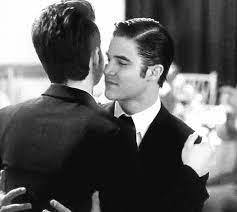
The First NYC All College Gay Mixer. There's a woman DJ playing records who Blaine assumes is a member of the tribe. There are colorful decorations and balloons like any old high school dance. There's a bar for non-alcoholic drinks with all the under 21's in the house. And even bowls of chips and dips to give the shy and awkward something to do. Which is maybe where Blaine will end up finding himself tonight even though he had higher hopes.
"I really screwed up, Elliott," Blaine sighs as they set out chairs and people start to amble in.
"So is an 'I told you so' in order?" Elliott teases with affection.
"Maybe. I mean, I don't know. I was hanging out with Kurt yesterday," Elliott crosses his arms and nods, a bit amused. "And he offered me some weed-"
"Ohhh experimenting, I see. So you had a bad high and ended up weeping and confessing your unrequited love to Kurt who was scandalized?" Blaine knows he's kidding but he's not far off.
"Actually, the buzz was fine. We were both chilling on the grass, talking, when Kurt kind of confessed that he likes," Blaine pauses. "Me."
"Oh my god, Blaine. That's awesome - and I see an I told you so is definitely in order. But why are you-"
"That's just it. I was high. I could barely feel my hands and I was tingly all over and I was worried I might not remember and it just was not romantic at all. All I knew was that this was the wrong place at the wrong time-"
"For the right thing," Elliott finishes. "Oh Blaine. Who knew the romantic in you would cause you so much trouble?"
"Yeah, I guess. So I told him that I was high and that I really care about him-"
"Oh man," Elliott shakes his head and Blaine looks down at the floor. Cone of shame.
"I felt like I was clear. Like that I want to continue this conversation but-"
"Blaine, I mean this with love, but you are not clear. You are confusing at best and self-sabotaging at worst. This guy was pretty clearly gay and into you and it is taking you far too long to get to this place and only because he confessed."
"I know," Blaine shakes his head, defeated. "So what do I do? I know it's probably too late."
"Of course it's not too late. It's been one day. He hasn't found someone else. You wanted romantic, right?" Blaine nods. "Well we are at a dance."
...
The plan is a good one, as long as Kurt still decides to show up. Blaine's not sure he would in the same situation - knowing the guy he thinks rejected him - he did not reject him - would be there. The dance started at 8:30 but the clock is about to strike 9:30 but still no Kurt. He sighs and takes a sip of his 7-Up with a squeeze of lemon. All around him is a glorious and affirming picture of the world he could only have imagined last year - people in fun and deliberately outrageous outfits dancing in groups, dancing in pairs - Sebastian and Elliott are two of them, unselfconscious as always, holding each other close and dirty dancing. There are two women he doesn't know kissing in the corner of a couch, and the DJ is playing only the best tunes of the decade. He should be soaking it all up but he's distracted. He's already thinking of ways he'll try to fix all this next week, maybe corner Kurt after class, insist he talk to him?
Then he looks up. Kurt is in the doorway, with perfectly coiffed hair and the grooviest outfit he's ever seen - Bright orange pants with a bold flower pattern, yellow matching button down top but it's the neck kerchief that makes the outfit. He's got such style. God what was Blaine thinking not just grabbing him and kissing him last night? Just that thought makes him tingle but not the pot kind of tingle.

Kurt's eyes survey the room and land on his. He tries to hold the stare when Kurt nods, but Kurt looks away and walks over to the bar. Blaine takes a deep breath. He couldn't really have expected Kurt to come over to him after yesterday.
Once Kurt has his drink and he sees him wave at Sebastian and Elliott and walk over to say hi, he walks towards the DJ and gives his nod. The music starts and he sees Elliott tap Kurt on the shoulder and point over at him. Kurt turns and makes eye contact. He walks towards them, looking at Kurt as the music plays.
You're just too good to be true Can't take my eyes off of you You'd be like Heaven to touch I wanna hold you so much
Kurt stares at Blaine questioningly as he approaches, but he doesn't look away. Blaine extends his hand to Kurt and sings along with the music.
Pardon the way that I stare There's nothin' else to compare The sight of you leaves me weak There are no words left to speak But if you feel like I feel Please let me know that it's real You're just too good to be true Can't take my eyes off of you
The song continues but Blaine stops, hand still outstretched. "May I have this dance?" He can feel his own heart thumping.
Kurt's cheeks are pink, and he crosses his arm with a bit of attitude, but his eyes betray him because he looks happy-surprised, and maybe relieved. “I believe I let you know last night, but you rejected me, remember?” Kurt puts his hands on his hips but Blaine sees the hint of smile.
“I didn’t reject you," Blaine says plainly. He takes Kurt's tentative hand and leads him to the dance floor. Kurt lets him pull him in close.
“I beg to differ,” Kurt answers but he goes willingly, moving into Blaine's space.
“I was a little high," Blaine provides in explanation. Again. He steps away from his body and twirls him. "I told you that. I was waiting for the right moment."
“Honestly, Blaine. You don’t have to make excuses. I can handle it," Kurt steels himself and takes a small step back from Blaine's body, still dancing. "Like you say in your workshop - don’t assume we’re attracted to you.”
Blaine shakes his head and pulls Kurt in tight, hand firmly on the small of his back. “We also say," Blaine looks directly at him, "don’t assume we’re not attracted to you." Kurt's eyes go wide. He hears it. Finally. "And Kurt, you have no idea.”
Blaine looks at Kurt meaningfully, doesn't let Kurt break the stare. Yes I want this too. Yes I'm attracted to you. I don't know why I was so clueless but I'm here now. He feels Kurt all along his body, warm and strong and he feels so good. Blaine can feel Kurt’s heart beating. Or is that the music? Kurt is stunned. "Umm," Kurt starts but stops again and he smiles.
Blaine moves his hand to Kurt's face, and he can feel the warm blush under his skin. "I'm going to kiss you now, okay?" Kurt nods, still with that slight look of awe on his face. Blaine wants to burn it in his memory.
He closes his eyes. Finally. Kurt's mouth is soft and warm and Blaine can taste he thinks strawberry chapstick. They move their lips on and off each others a few times, testing. Eyes checking in as Kurt bites playfully at his lower lip. It isn't enough. Blaine pulls Kurt flush against his body, and opens his mouth wide on Kurt's. It's an instinct and it feels daring. Sexual.
Kurt mirrors him. He wants him too. Wants them kissing on a dance floor. Better than any fantasy Blaine ever had late at night under his covers with his dog earred magazine. This is just kissing - making out really - he's making out - but he can feel the desire coursing through him from the tops of his blushing ears to the tips of his toes. Their tongues are soft together, ticklish but rhythmic and driving. He suddenly understands why French kissing is considered first base.
Standing and dancing, Blaine can feel Kurt's body everywhere - chest against chest, legs intertwined, bodies responding against each other. Kurt's body is bigger than his but they're both strong. He squeezes Kurt's bicep, feels it contract. Kurt's tongue is making him feel hot all over. He feels himself starting to get hard and their bodies are so close that he wonders if Kurt notices. He sort of hopes he does. His body speaking the moment out loud. You turn me on. He feels alive.
Later in the evening, they're sitting in a corner of the couch, right where the two women were making out earlier. Now it's him. Them. Kurt is in the corner turned sideways towards him, and he has his leg up so he can be face to face with Kurt. They've calmed down since the dance floor, kissing is softer, deeper, less frantic. Kurt's hand is holding his face, kissing him slowly. Blaine's mouth and lips are tired but he doesn't want to stop. Wants to kiss lazily forever. His hand is flat on Kurt's chest, learning its shape. He can feel his breath and his heart beating.
"We're on our way, boys." Sebastian's voice is jarring and suddenly he's right there, interrupting them. He and Elliott are standing in front of them, arms around each other, ostensibly saying their goodbyes but clearly highly amused.
"Have a good one?" Blaine says, unsure what the protocol is when someone interrupts you in the middle of something else.
"Oh we will," Sebastian assures. "And you too," He grins. "It's about fucking time," Sebastian shakes his head. "Just be good and don't do anything I wouldn't do."
"You never know, Sebastian," Kurt muses. "We hippies have a natural inclination for the forbidden." Blaine loves this Kurt. Wants more. So much more.
"Glad to see you two finally got your shit together," Elliott salutes them as he starts to pull Sebastian away.
Kurt turns back to Blaine and moves into his space again, lazy tired lips speaking on top of his. "I guess we did."
#had to happen eventually#just how these things work#klaine spring fling#can't take my eyes off of you#gleekto writes
26 notes
·
View notes
Text
Saints&Reading: Thursday, July 6, 2023
july 6_june 23
THE HOLY MARTYR AGRIPPINA OF ROME (around253 260)

The Holy Martyr Agrippina, was by birth a Roman. She did not wish to enter into marriage and totally dedicated her life to God. During the persecution against Christians under the emperor Valerian (253-259), the saint went before the court and bravely confessed her faith in Christ, for which she was given over to torture. They beat the holy virgin with sticks so severely that her bones broke. Afterward, they put Saint Agrippina in chains, but an angel freed her from her bonds.
The holy confessor died from the tortures she endured. The Christians Bassa, Paula, and Agathonike secretly took the holy martyr's body and transported it to Sicily, where many miracles were worked at her grave. The sacred Martyr Agrippina relics were transferred to Constantinople in the eleventh century.
SAINT ETHELDREDA of ELY ( England_679)
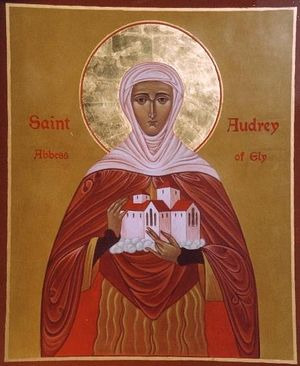
The Anglo-Saxon historian Bede gives us the earliest known account of Etheldreda’s life in his Ecclesiastical History of the English People, which he completed in 731, around half a century after Etheldreda’s death. He tells us that she was the daughter of Anna, King of the East Angles, and was brought up in the Christian faith (at the time of her birth, some kingdoms, notably Mercia, were still pagan).
Etheldreda entered into two arranged marriages. The first was to an ealdorman, or chieftain, of the local South Gyrwe tribe, a man named Tondberht, who died a few years later. She was then married to Ecgfrith, a prince of Northumbria. Ecgfrith and Etheldreda became King and Queen of Northumbria in 670.
It may seem surprising, in the circumstances, that Etheldreda was venerated as a virgin saint. In the early church, virginity was prized as the highest state of life for both men and women, and Bede is insistent that Etheldreda remained a virgin throughout both of her marriages. He says that he consulted Bishop Wilfrid, who had been Etheldreda’s spiritual advisor, on the subject, and that Wilfrid had unequivocally confirmed her virginity.
Bede does not tell us what Tondberht, Etheldreda’s first husband, felt about this situation, but Ecgfrith was clearly not happy – as a King, he would presumably have wanted an heir to the throne. He asked Bishop Wilfrid several times to intercede with Etheldreda, to persuade her to consummate the marriage, but she consistently refused and begged to be allowed to become a nun. Eventually, after twelve years of marriage, Ecgfrith agreed to let her go, and she entered the monastery of Coldingham. This allowed Ecgfrith to remarry, which he did. He died in battle, fighting the Picts, in 685.
Pictish symbol stone depicting the Battle of Dun Nechtain, in which Ecgfrith was killed.
A year after she had taken the veil at Coldingham, Etheldreda returned to her home in the Kingdom of the East Angles and founded her own monastery at Ely, where she became Abbess and was famed for her ascetic lifestyle. Etheldreda’s foundation was a double monastery, housing both men and women, which was the practice of the Anglo-Saxon church up to 787, when the Second Council of Nicaea banned mixed foundations.
Etheldreda died in 679, from a tumour in her neck – which she is said to have regarded as a divine punishment for her earlier fondness for necklaces. Her sister Seaxburh, widow of King Eorcenberht of Kent, succeeded her as Abbess of Ely. Etheldreda had insisted on being buried in a simple wooden coffin, but sixteen years after her death, Seaxburh decided to move her body to a more impressive tomb within the Abbey church. On exhumation, her body was discovered to be incorrupt, a sure sign of sainthood.
In the medieval period, Etheldreda’s shrine at Ely became an important pilgrimage center. As stories of cures and miracles at the site of her tomb spread, Etheldreda’s reputation grew; by the 14th century, she was known and revered throughout Western Europe.
By this time, Bede’s brief biography of Etheldreda had been expanded by later writers, most notably in the Liber Eliensis, a 12th-century chronicle of the monastery and Isle of Ely – now available in an English translation by Janet Fairweather (Boydell Press, 2005). The Liber was written by a monk of Ely, now an exclusively male Benedictine monastery. His chronicle recounts stories and traditions that had grown up around Etheldreda in the four centuries since Bede’s History. These include an exciting account of Ecgfrith’s supposed pursuit of Etheldreda as she journeyed south from Coldingham to Ely, and the miracles that accompanied her on the way. Several of these miracles – such as leaves sprouting from a staff, and water springing from rocks – recall Old Testament stories and can be found in the Lives of other saints.
A number of the stories about Etheldreda that appear in the Liber have been written with more than one purpose. They bolster her reputation as a powerful and holy woman, but at the same time, they further the interests of the medieval monastery.
One of the themes running through the Liber is the justification of the monastery’s claims to ownership of its lands, especially the Isle of Ely. The author refers a number of times to a story that Tondberht, Etheldreda’s first husband, gave her the Isle as a wedding gift. This is not necessarily untrue, although the story clearly has a practical function in the Liber, where it is invariably linked in the text with assertions that absolute ownership of the Isle had passed directly from Etheldreda to the medieval monastery.
Etheldreda was also portrayed by the author of the Liber as the protector of the monastery, a warrior saint who would defend its interests and punish its enemies. This occasionally took the form of actual violence against offenders: in the late 11th century, a man called Gervase, one of the administrators of the Norman sheriff of Cambridge, who was hostile to the monastery, took legal proceedings against the Abbot. The Liber recounts that, before the case could take place, Gervase was visited by Etheldreda and her sisters, Wihtburh and Seaxburh, who rebuked him and then ‘wounded him with the hard points of their staves’ – that is, their abbesses’ staffs. The servants heard his screams, and the unfortunate man lived long enough to tell them he had been attacked by the saints before dying of his wounds.
The monastery of Ely was dissolved at the Reformation in 1539, and its shrines were destroyed. Etheldreda’s reputation suffered an eclipse in the following centuries, which lasted until the revival of interest in the saints in the late nineteenth century, sparked by the rise of the Anglo-Catholic movement and a lessening hostility towards Catholicism within the established Church.
The Church of England’s calendar celebrates Etheldreda on two feast days: 23rd June (her death) and 17th October (when her body was moved and found to be incorrupt). A relic, believed to be the saint’s hand, is displayed in Ely’s Catholic church, which bears her name. This year 2023, the cathedral is marking the 1,350th anniversary of the foundation of Saint Etheldreda’s monastery with a unique program of events, concerts, exhibitions, and services.
by Elaine Thornton
Published: 17th March 2023 in Historic. UK

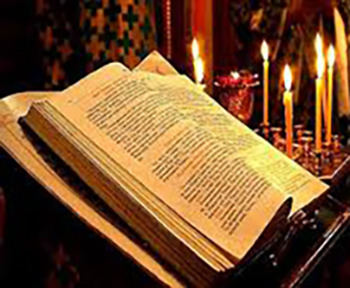
ROMANS 15:17-29
17 Therefore, I have reason to glory in Christ Jesus in the things which pertain to God. 18 For I will not dare to speak of any of those things which Christ has not accomplished through me, in word and deed, to make the Gentiles obedient 19 in mighty signs and wonders, by the power of the Spirit of God, so that from Jerusalem and round about to Illyricum I have fully preached the gospel of Christ. 20 And so I have made it my aim to preach the gospel, not where Christ was named, lest I should build on another man's foundation, 21 but as it is written:"To whom He was not announced, they shall see; And those who have not heard shall understand." 22 For this reason, I also have been much hindered from coming to you. 23 But now no longer having a place in these parts and having a great desire these many years to come to you, 24 whenever I journey to Spain, I shall come to you. I hope to see you on my journey and be helped there by you, if first I may enjoy your company for a while. 25 But now I am going to Jerusalem to minister to the saints. 26 For it pleased those from Macedonia and Achaia to make a specific contribution for the poor among the saints in Jerusalem. 27 It pleased them indeed, and they are their debtors. If the Gentiles have been partakers of their spiritual things, they must also minister to them in material things. 28 Therefore, when I have performed this and have sealed to them this fruit, I shall go by way of you to Spain. 29 But I know that when I come to you, I shall come in the fullness of the blessing of the gospel of Christ.
MATTHEW 12:46-13:3
46 While He was still talking to the multitudes, His mother and brothers stood outside, seeking to speak with Him. 47 Then one said to Him, "Look, Your mother and Your brothers are standing outside, seeking to speak with You." 48 But He answered and said to the one who told Him, "Who is My mother, and who are My brothers?" 49 And He stretched out His hand toward His disciples and said, "Here are My mother and My brothers! 50 For whoever does the will of My Father in heaven is My brother, sister, and mother.
1 Jesus left the house and sat by the sea the same day. 2 And great multitudes were gathered together to Him, so He got into a boat and sat, and the whole multitude stood on the shore. 3 He spoke many things to them in parables: "Behold, a sower went out to sow.
#orthodoxy#orthodoxchristianity#easternorthodoxchurch#originofchristianity#spirituality#holyscriptures#gospel#bible#wisdom
0 notes